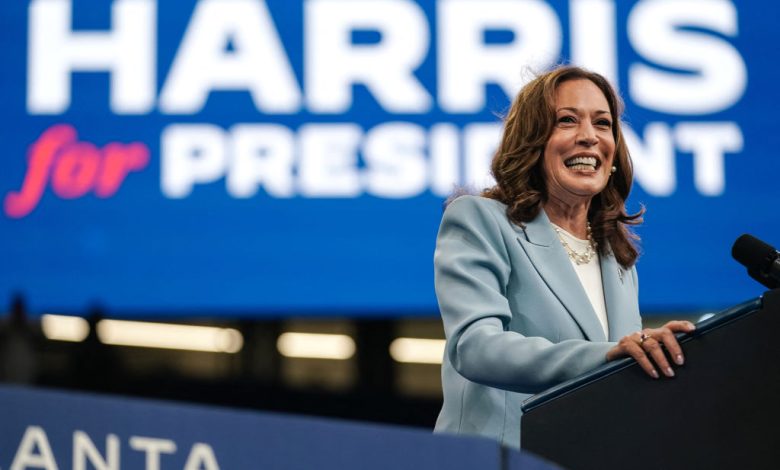Kamala Harris, Racist Birther Attacks And Presidential Eligibility


Vice President and 2024 Democratic presidential candidate Kamala Harris speaks at a campaign rally in Atlanta, Georgia, on July 30, 2024. | Source: ELIJAH NOUVELAGE / Getty
You may have heard the rumor that Kamala Harris isn’t eligible to be president because neither of her parents was born in the United States and they had unclear citizenship status when Harris was born in Oakland, California, in 1964.
That’s the false claim that some Harris opponents have begun recirculating since she became the Democrats’ presumptive nominee for president following President Joe Biden’s decision to step aside on July 21, 2024. The claim originated in 2020, when she was chosen as Biden’s vice presidential running mate.
John Eastman, Trump’s former legal adviser who was indicted for allegedly interfering with the 2020 presidential election, originally circulated this claim. But mainstream legal scholars agree: There’s no truth to it.
The recycling of this falsehood offers an opportunity to dive into the actual facts about presidential eligibility, by way of some candidates from recent history.
Harris is protected by birthright citizenship
How do we know that claims about Harris’ eligibility are wrong?
Article II, Section 1 of the Constitution sets the rule: “No Person except a natural born Citizen, or a Citizen of the United States, at the time of the Adoption of this Constitution,” says Section 1, “shall be eligible to the Office of President.”
The other presidential requirements in the Constitution — that a candidate be at least 35 years old and have lived in the U.S. for 14 years prior to their candidacy — are fairly cut-and-dried. But what does the document mean by “natural born Citizen”?
The original Constitution doesn’t specify, but both courts and lawmakers have weighed in since the founding. The first piece of evidence is the 14th Amendment, which was enacted after the Civil War to ensure that formerly enslaved Black Americans and their children were recognized as citizens.
“All persons born or naturalized in the United States, and subject to the jurisdiction thereof,” the amendment states, “are citizens of the United States.”
The 14th Amendment establishes what is commonly referred to as “birthright citizenship” — that if a person is born on American soil, then there is nothing else they need to do to become a fully-fledged citizen of the United States. Supreme Court cases since the passage of the 14th Amendment clarify specifically that those born in America to foreign parents qualify as “natural born.”
Whether Harris would be an effective president is a matter for the voters to decide in a few months. But as a legal matter, she is absolutely eligible to hold the office. Because Harris was born in the U.S., the citizenship status or birthplace of either of her parents is irrelevant. Even those facts have not been enough to quiet some of the falsehood promoters, who more recently have claimed Harris was not born in the U.S. But her birth certificate was reviewed by The Associated Press, and it confirms that she was born in Oakland.
Can foreign-born candidates serve as president?
History has seen cases more complicated than Harris’, with a number of presidential candidates who were not born in one of the 50 states. So does being born outside of the U.S. disqualify candidates from serving as president?
Not necessarily. Take, for example, the late Arizona Senator John McCain, who was the Republican nominee in 2008. McCain was born not in a state, but in the Panama Canal Zone in 1936 while his father was stationed there as a naval officer. However, the Canal Zone was under American control at the time of McCain’s birth. And because the 14th Amendment specifies that citizenship also applies to those “subject to the jurisdiction” of the U.S., McCain was eligible to serve as president.
At the time, McCain cited as precedent for his eligibility the successful nomination of Sen. Barry Goldwater, the 1964 Republican nominee who was born in 1909 in the Arizona Territory, just a few years before it was admitted to the union as a state.
Even McCain’s main Democratic rivals for the presidency, Sens. Barack Obama and Hillary Clinton, co-sponsored a resolution in April 2008 asserting that McCain was a “natural-born citizen” and thus eligible to be president.
McCain was also likely in the clear because historically, U.S. law has said that someone “born outside the United States to a U.S. citizen parent (or parents) is a U.S. citizen at birth.” This is the same precedent that, had he been elected president, would likely have applied to U.S. Senator and 2016 candidate Ted Cruz, a Republican representing Texas, who was born in Canada but whose mother was an American citizen by birth.
Race and ethnicity in the background
No major candidate for the presidency has ever been in serious jeopardy because of the “natural born citizen” clause, and Harris is no exception.
The Constitution does not protect her, however, from the same sorts of race-based political attacks that Donald Trump leveled against Obama, a yearslong crusade that came to be known as “birtherism.” During Obama’s presidency, Trump falsely asserted that Obama wasn’t born in the United States. As has been documented, Obama was born in Hawaii.
None of the vice president’s high-profile critics, including Trump, are making quite such extreme accusations against Harris. But as with Obama, there is an unspoken, racist implication: This candidate is foreign. They’re not like you and me. They’re anti-American.
Charlie Hunt, Assistant Professor of Political Science, Boise State University
This article is republished from The Conversation under a Creative Commons license. Read the original article.
![]()
SEE ALSO:




